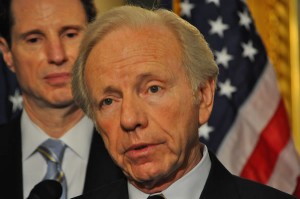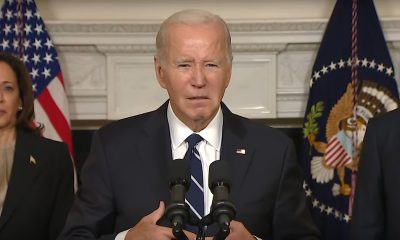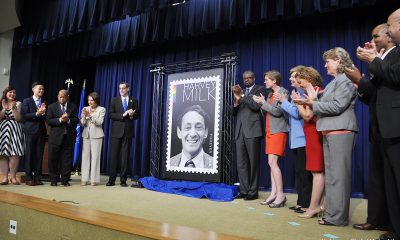National
Lieberman confident about 60 votes for ‘Don’t Ask’ repeal
Conn. senator says he’s received assurances from Collins, Lugar


Sen. Joseph Lieberman (I-Conn.) is optimistic about "Don't Ask, Don't Tell" repeal in lame duck. (Blade photo by Michael Key).
Sen. Joseph Lieberman (I-Conn.) on Thursday expressed confidence about having the necessary 60 votes to move forward with legislation containing “Don’t Ask, Don’t Tell” repeal — provided certain conditions are met with the amendment process on the Senate floor.
“I am confident that we have more than 60 votes prepared to take up the defense authorization bill with the repeal of ‘Don’t Ask, Don’t Tell’ if only there will be a guarantee of a fair and open amendment process,” Lieberman said during a news conference. “In other words, whether we’ll take enough time to do it.”
Lieberman makes the remarks after Senate Majority Leader Harry Reid (D-Nev.) said on Wednesday he’s committed to bringing to the floor in the lame duck session the fiscal year 2011 defense authorization bill, which contains language that would repeal “Don’t Ask, Don’t Tell.”
The legislation would likely come up after Dec. 1, when a Pentagon working group is due to deliver a report to Defense Secretary Robert Gates on implementing repeal.
Lieberman said he’s received assurances from GOP senators Susan Collins (R-Maine) and Richard Lugar (R-Ind.) as well as “others privately” that they would be open to moving forward with defense legislation containing “Don’t Ask, Don’t Tell” repeal provided there’s an “open amendment process” in bringing the bill to the floor.
A previous attempt in September at bringing the defense authorization bill to the floor failed when a united GOP caucus — led by Sen. John McCain (R-Ariz.) — successfully filibustered the motion to proceed.
Many senators, including Collins and Lugar, who supported a repeal amendment in committee, said they were voting “no” because of limited amendments that senators would be allowed to submit for the legislation.
In September, Reid said he was permitting three amendments to the defense authorization bill: one to strip the bill of its repeal provision, one to address the “secret holds” that senators can place on presidential nominations and another to amend the defense legislation with the DREAM Act, an immigration-related bill.
Asked during the conference what he perceived as more open amendment process the next time around, Lieberman the exact terms are up for negotiation.
“It’s hard to put a number on it now,” Lieberman said. “That’s what I hope is going to be negotiated. Of course, we’ll do our best to encourage Sen. Reid to reach out to allow and somewhat larger number.”
Lieberman said the two items that are up for negotiation are the number of amendments to be allowed and the time for debate on those amendments.
Reid has since said the DREAM Act would come to the Senate floor during lame duck as a standalone piece of legislation.
Following the news conference, Lieberman said the removal of the DREAM Act as an amendment to the defense authorization bill would “practically speaking” help with building support for moving forward with the military budget legislation.
But Sen. Jeanne Shaheen (D-N.H.), who present at the conference, said opposition to the defense authorization bill and “Don’t Ask, Don’t Tell” repeal is actually for reasons other than “how many amendments are we going to do, or long we’re going to debate.”
“This is about those who oppose this policy wanting to kill it and taking every opportunity they can and using the Senate rules to try and do that,” Shaheen said. “That’s exactly what’s going on here.”
Lieberman also maintained the Senate would have enough time to tackle “Don’t Ask, Don’t Tell” repeal as it addresses other priorities, such as a nuclear arms reduction treaty and the extension of tax cuts.
“We’re just before Thanksgiving,” Lieberman said. “We’ve been told early on that we’d be here at least three weeks. That’s a lot of time into December, so we’ll be here at least until the week before Christmas. It’s just a question of how hard we’re prepared to work to get these things done. They’re all important.”
Lieberman said President Obama “has been active” on this issue and has been in communication with Reid as well as Senate Armed Services Committee Chair Carl Levin (D-Mich.) on moving forward with the defense authorization bill with “Don’t Ask, Don’t Tell” repeal.
“I think he’ll, in my opinion, do everything he can to see that we get this done by the end of this year,” Lieberman said.
The news conference on Thursday was a hot spot for senators who advocate for “Don’t Ask, Don’t Tell.” Among the 13 lawmakers who made an appearance were Sens. Mark Udall (D-Colo.), Kirsten Gillibrand (D-N.Y.), Barbara Boxer (D-Calif.), Al Franken (D-Minn.) and Chris Coons (D-Del.) who recently took his seat after winning election in November.
Udall said Congress needs to take action to end “Don’t Ask, Don’t Tell” this year because further delay could it “could be years” for repeal to happen.
“We’ve reached an unprecedented level of gridlock here in the Senate when legislation that funds our troops provides for our national security and makes sure that we lead the world in the 21st century is blocked from even coming to the floor for debate,” Udall said. “We ought to welcome the debate — we have an idea of how that debate will turn out — but we’re going to have that opportunity to have this vote on the floor if we have courage and are steadfast.”
The senators joked among themselves that they would work through Christmas Eve — or for Lieberman, who’s Jewish, the eighth day of Hanukkah — to finish the effort in repealing”Don’t Ask, Don’t Tell.”
Sen. Roland Burris, known as a strong voice for repeal during his tenure in the Senate, said he thinks ending “Don’t Ask, Don’t Tell” would be an important victory, but noted the vote in the Senate “may come too late” for show his support.
Because he was appointed to his position in the Senate in 2009, Burris is required by Illinois state law to give up his seat to Republican Senator-elect Mark Kirk during the lame duck session of Congress and may even leave the U.S. Senate this week.
“As a black American, I know what it means to go through discrimination and unfairness, and there’s no way in the world we can have a strong military and deny those persons who are gay and lesbian … an opportunity to serve their country,” Burris said. “I support that wholeheartedly and am just sorry that I may not be here to cast the vote.”
It remains to be seen how Kirk would vote on the legislation in Burris’ stead. As a U.S. House member, Kirk voted against a “Don’t Ask, Don’t Tell” repeal amendment in May that came to the House floor.
Sen. Dianne Feinstein (D-Calif.) went a step further than other senators at the news conference when she said she believes “Don’t Ask, Don’t Tell” is unconstitutional. Some repeal advocates have been asking for President Obama to declare the law unconstitutional so he could discontinue enforcement of the law.
“I’m not a lawyer, but I believe in my heart of hearts that ‘Don’t Ask, Don’t Tell’ is unconstitutional,” Feinstein said. “As a matter of fact, a federal district court has found that that, in fact, is the case, and it’s simple because it treats the same case of people differently.”
Still, not every member of the U.S. Senate is on board with repeal. Asked during the news conference whether he had spoken to Sen. John McCain (R-Ariz.) about getting him to support an end to the law, Lieberman said he has had such conversations, but he has had “no success” in converting the Arizona senator.
Among those present at the news conference were advocates working for repeal of “Don’t Ask, Don’t Tell,” including Joe Solmonese, president of the Human Rights Campaign, Winnie Stachelberg, senior vice president for external affairs for the Center for American Progress, and Aubrey Sarvis, executive director of the Servicemembers Legal Defense Network.
Lt. Col. Victor Fehrenbach, a gay Air Force pilot who’s served in the military for 19 years, was also present at the conference and told his story about how he’s now facing potential discharge under “Don’t Ask, Don’t Tell.”
“Right now, my ‘Don’t Ask, Don’t Tell’ is somewhere in the Pentagon, and I am fighting back in federal court with SLDN and my legal team to stay in the Air Force,” he said.
U.S. Supreme Court
Concern over marriage equality in US grows two decades after first Mass. same-sex weddings
Gay and lesbian couples began to marry in Bay State in 2004

Two decades after Massachusetts became the first state to legalize same-sex marriage, a new study reveals both significant progress and ongoing challenges for married LGBTQ couples in the U.S., with a growing sense of insecurity about the future of their rights.
The Williams Institute at UCLA School of Law surveyed 484 married same-sex couples from all 50 states and D.C. The study, released Monday, marks the 20th anniversary of legal same-sex marriage in the U.S.
Researchers found that 93 percent of respondents cited love as a primary reason for marrying, with 75 percent also mentioning legal protections. Over 83 percent reported positive changes in their sense of security, and 74.6 percent noted improved life satisfaction since marrying.
However, the study also highlighted persistent discrimination and growing concerns about the future. About 11 percent of couples who had a wedding reported facing prejudice during the planning process.
Alarmingly, nearly 80 percent of respondents expressed concern about the potential overturning of the 2015 Obergefell v. Hodges decision, which legalized same-sex marriage nationwide. This anxiety has been exacerbated by initiatives like Project 2025, a conservative policy blueprint that some fear could roll back LGBTQ rights if implemented.
The possibility of a former President Donald Trump victory in the upcoming election has further intensified these concerns. Many respondents cited Trump’s previous U.S. Supreme Court appointments and his statements on LGBTQ issues as reasons for their apprehension. One participant stated, “The thought of another Trump presidency keeps me up at night. We’ve come so far, but it feels like our rights could be stripped away at any moment.”
The current political climate has 29 percent of respondents considering moving to another state, with 52.9 percent citing socio-political concerns as a primary reason. This reflects a growing sense of insecurity among LGBTQ couples about their rights and freedoms.
Brad Sears, founding executive director of the Williams Institute, noted, “The data clearly show that marriage equality has had a profound positive impact on same-sex couples and their families. However, it also reveals ongoing challenges and serious concerns about the future of these rights in light of current political trends and the upcoming election.”
Christy Mallory, legal director at the Williams Institute and lead author of the study, added, “This research provides crucial insights into the lived experiences of same-sex couples two decades after marriage equality began in the U.S. The high level of concern about potential loss of rights underscores the continued importance of legal protections and public support for LGBTQ+ equality.”
The study found that 30 percent of surveyed couples have children, with 58.1 percent of those parents reporting that marriage provided more stability for their families. However, many of these families now worry about the security of their legal status in the face of potential policy changes and shifting political landscapes.
As the nation reflects on two decades of marriage equality, the study underscores both the transformative power of legal recognition and the ongoing need for vigilance in protecting LGBTQ+ rights. The findings highlight the complex reality faced by same-sex couples in America today: Celebrating hard-won progress while grappling with uncertainty about the future, particularly in light of upcoming political events and potential shifts in leadership.
State Department
State Department hosts meeting on LGBTQ rights and foreign policy
Event took place before Pride Month reception

Secretary of State Antony Blinken on Thursday hosted a group of LGBTQ activists and politicians from around the world at the State Department.
The event — described as a “Convening on U.S. Foreign Policy: National Security, Inclusive Development, and the Human Rights of LGBTQI+ Persons” — took place before the State Department’s annual Pride Month reception. Participants included:
• Jessica Stern, the special U.S. envoy for the promotion of LGBTQ and intersex rights
• U.S. Ambassador to the U.N. Linda Thomas-Greenfield
• U.S. Trade Representative Katherine Tai
• U.S. Ambassador to India Eric Garcetti
• Suzanne Goldberg, senior advisor to the Under Secretary of State for Civil Security, Democracy, and Human Rights
• Under Secretary of State for Civilian Security, Democracy, and Human Rights Uzra Zeya
• U.S. Agency for International Development Senior LGBTQI+ Coordinator Jay Gilliam
• USAID Counselor Clinton D. White
• National Security Council Senior Director for Democracy and Human Rights Kelly Razzouk
• Assistant U.S. Secretary of Health Adm. Rachel Levine
• National Security Council Human Rights Director Jess Huber
• U.N. Assistant Secretary General for Human Rights Ilze Brandt Kehris
• Icelandic Ambassador to the U.S. Bergdís Ellertsdóttir
• Council for Global Equality Co-Executive Director Mark Bromley
• Outright International Senior Advisor for Global Intersex Rights Kimberly Zieselman
• Essy Adhiambo, executive director of the Institute for Equality and Non Discrimination in Kenya
• Pau González, co-chair of Hombres Trans Panamá and PFLAG-Panamá
“Forty-five years ago, thousands gathered in D.C. in what became the first national march for LGBTQI+, demanding their voices be heard,” said Thomas-Greenfield in a post to her X account that showed her speaking at the event. “We must continue to carry forward the spirit of these pioneers and fight for equal rights and dignity for all.”
Forty-five years ago, thousands gathered in DC in what became the first national march for LGBTQI+, demanding their voices be heard.
We must continue to carry forward the spirit of these pioneers and fight for equal rights and dignity for all. 🏳️🌈🏳️⚧️ pic.twitter.com/oph2Ahmfhq
— Ambassador Linda Thomas-Greenfield (@USAmbUN) June 28, 2024
President Joe Biden in 2021 signed a memo that committed the U.S. to promoting LGBTQ and intersex rights abroad as part of his administration’s overall foreign policy.
“LGBTQI+ rights are human rights,” said Blinken. “Our government has a responsibility to defend them, to promote them — here and everywhere.”
Blinken noted consensual same-sex sexual relations remain criminalized in 64 countries, with the death penalty in 11 of them.
He specifically highlighted Uganda’s Anti-Homosexuality Act and Hungarian Prime Minister Viktor Orbán’s government’s “smearing scapegoating, stigmatizing LGBTQI+ persons — vilifying them with degrading labels, denying them equal rights, normalizing violence against them.” (Gay U.S. Ambassador to Hungary David Pressman this month marched in the annual Budapest Pride parade.)
Blinken noted Iraqi MPs earlier this year “passed legislation that punishes same-sex relations with up to 15 years in prison.” He also pointed out that Indonesian lawmakers approved a new criminal code banning extramarital sex.
“In a nation where same-sex couples cannot marry, these laws effectively make all same-sex conduct illegal and they undermine privacy for all Indonesians,” said Blinken.
“We’re defending and promoting LGBTQI+ rights around the world,” he said.
Blinken noted seven countries — Barbados, St. Kitts and Nevis, Antigua and Barbuda, Dominica, Namibia, Singapore, the Cook Islands — have decriminalized consensual same-sex sexual relations over the last two years. He also highlighted Greece, Liechtenstein, and Thailand this year extended marriage rights to same-sex couples, and other countries are banning so-called “conversion therapy.”
“These achievements are possible because of incredibly courageous human rights defenders and government partners on the ground, but I believe America’s support is indispensable,” said Blinken. “When we engage — sometimes publicly, sometimes privately, sometimes both — when we share our own knowledge and experience, we can and we do achieve change.”
Blinken also announced the U.S. now considers sexual orientation and gender identity are part of the International Covenant on Civil and Political Rights that took effect in 1976.
“This is one of the key treaties committing nations to upholding universal rights,” he said.
“In our regular reporting to the council on human rights, we will continue to include incidents of discrimination or abuse committed against LGBTQI+ persons, now with the clear framework of this well-supported interpretation,” added Blinken. “That will further empower our efforts.”
Blinken reiterated this point and the Biden-Harris administration’s commitment to the promotion of LGBTQ and intersex rights abroad when he spoke at the State Department’s Pride Month event.
“Defending, promoting LGBTQI+ rights globally is the right thing to do, but beyond that, it’s the smart and necessary thing to do for our country, for our national security, for our well-being,” he said.
The White House
Jill and Ashley Biden headline White House Pride celebration
First lady celebrated historic pardons of LGBTQ veterans

First lady Jill Biden and the president and first lady’s daughter, Ashley Biden, headlined the White House Pride celebration on the South Lawn on Wednesday, followed by a performance by singer and actress Deborah Cox.
“My dad has built the most pro-equality administration” in history, Ashley Biden said, crediting the work of LGBTQ people of color like Marsha P. Johnson, a prominent figure in the Stonewall uprising of 1969, as well as “so many of you [who] have continued to lead their fearless fighting against against injustice here and around the world.”
She introduced her mother as “the woman who taught me to be myself up showed me in so many ways how I can make a difference” and who “works every single day, tirelessly, to ensure that all people have the opportunities and freedoms that they deserve.”
“I hope that all of you feel that freedom and love on the South Lawn today,” Jill Biden said.
Her remarks were briefly interrupted by a protestor’s chants of “no Pride in genocide,” which was drowned out by chants of “four more years.”
The first lady noted how many of the attendees came “here from states that are passing laws targeting LGBTQ Americans.”
“There are those who see our communities and our families and wish to tear them down,” she said, “those who can’t see that the world is so much bigger and [more] beautiful than they know — but when our homes are threatened, when they strip away our rights, and deny our basic humanity, we say, ‘not on our watch.'”
“Pride is a celebration, but it is also a declaration,” the first lady said, highlighting the U.S. Supreme Court’s ruling in Obergefell v. Hodges nine years ago, which established marriage equality as the law of the land.
She then credited the accomplishments of the Biden-Harris administration on matters of LGBTQ rights, including the repeal of the previous administration’s ban on military service by transgender servicemembers and the FDA’s loosening of restrictions on blood donation by gay and bisexual men.
The first lady also celebrated the president’s announcement earlier on Wednesday that he will pardon LGBTQ veterans who were discharged and court martialed because of their sexual orientation or gender identity.
“We will never stop fighting for this community,” she said.

-

 Canada1 day ago
Canada1 day agoToronto Pride parade cancelled after pro-Palestinian protesters disrupt it
-

 Politics5 days ago
Politics5 days agoLGBTQ issues absent from Trump-Biden debate
-

 Theater4 days ago
Theater4 days agoStephen Mark Lukas makes sublime turn in ‘Funny Girl’
-

 Baltimore3 days ago
Baltimore3 days agoDespite record crowds, Baltimore Pride’s LGBTQ critics say organizers dropped the ball










